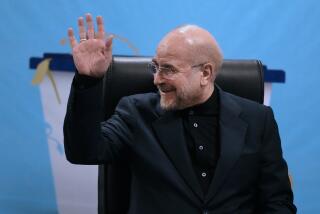Top Iraqi Politicians Show They’re in Campaign Mode
BAGHDAD — Three top contenders to become Iraq’s prime minister next year jockeyed for position and publicity Monday, the latest sign that political campaigning here is heating up.
In different locations around Baghdad at about the same time, the three Shiite Muslim politicians -- interim Prime Minister Iyad Allawi, interim Vice President Ibrahim Jafari and Abdelaziz Hakim, head of the Supreme Council for Islamic Revolution in Iraq -- held rival news conferences, outlining their views, rebuffing criticism and generally sounding like politicians running for office.
Though none has officially declared his desire to become the next prime minister, they are widely believed to be the leading hopefuls. Elections next month will select a transitional national assembly, which will appoint the prime minister.
In a blunt assessment of his six-month stint as interim prime minister, Allawi described the post as “horrible.”
“I don’t like the job,” Allawi told about a dozen reporters from Western news organizations at his office in the Green Zone, the heavily guarded government compound in Baghdad.
“It’s very tiring,” he said. “It’s very exhausting. It’s very demanding. It’s very dangerous. I face every day at least two or three attempts to assassinate me.”
Asked if he wanted to continue in the post, Allawi said, “I don’t know.”
Nevertheless, the former exile who received funding from the U.S. Central Intelligence Agency to battle Saddam Hussein announced last week his own slate of candidates for the Jan. 30 vote and has been increasing his visibility.
Last month he began appearing live on a government-owned television station, fielding call-in questions from viewers.
During his comments Monday, Allawi characterized himself as a strong leader willing to make controversial decisions, such as ordering the U.S.-led offensives in the cities of Fallouja, Samarra and Najaf.
Iraq “needs strength, a strong leadership with vision,” he said.
But those same decisions could come back to haunt Allawi on election day, particularly in their effect on Sunni Muslims, whose cities bore the brunt of the assaults.
The prime minister said he had been reaching out to Iraq’s Sunni population, including meeting with insurgent leaders to discuss ending the violence. Critics have charged that the negotiations lend credibility to militants, but he defended the practice.
“I tell [the insurgents] there is a political process, and they can be part of the political process,” Allawi said. “But to impose on us through terror activities and bullets and machine guns, this is unacceptable to us.”
On Sunday, at least 65 Iraqis were killed and 172 wounded in twin bomb attacks in the mainly Shiite cities of Najaf and Karbala. Najaf police said Monday that they had arrested 50 suspects, including at least one from outside Iraq.
“It’s very clear they want to incite racial and religious problems in Iraq,” Allawi said. “What happened in Najaf falls into this category. We know we will pay a heavy price until we win. We are expecting more attacks as we get closer, and even beyond the election.”
During their appearances Monday, Jafari and Hakim -- both running on the Shiite-dominated election slate created by the country’s leading cleric, Grand Ayatollah Ali Sistani -- responded to recent criticism that they are too closely allied with Iran and might seek to establish a theocracy in Iraq.
“The slate is an Iraqi slate and does not contain a single person whose Iraqi nationality can be questioned,” Hakim said during a briefing at his party’s compound along the Tigris River. “No one is calling for an Islamic government that resembles Iran.”
Iraqi Defense Minister Hazem Shaalan, who is running on a separate list, last week blasted the Shiite-dominated slate, called the United Iraqi Alliance. The outspoken official labeled it an “Iranian list” controlled by Tehran and dismissed some of the candidates, who sought refuge in Iran during Hussein’s regime, as agents of Iraq’s rival.
Jafari, speaking at a news conference called to discuss his recent travels to Egypt and Iran, blamed the political attacks on factions with “unclear motives” who hope to stir up anxiety among voters.
“We have to show the world that we are civilized enough to enter the political ring and compete with each other without flinging accusations at one another,” he said.
The fact that rivals are taking aim at the United Iraqi Alliance is hardly surprising given its expected strength at the polls. About 60% of Iraq’s population are Shiites, and Sistani is Iraq’s most influential leader.
The political appearances came as the deadline passed for amending the candidate slates. Voters will choose among 109 slates for the national assembly, totaling more than 7,700 candidates, election officials said. Slates will receive assembly seats according to their electoral showing and will fill them with the top candidates on their lists.
At the city’s convention center, hundreds of politicians gathered Monday morning to watch a public lottery to determine the order of the lists on the ballot.
Amid a festive atmosphere that contrasted with the typically somber mood of Iraqi political events, a blond-streaked election worker functioned as an Iraqi equivalent of TV’s Vanna White, pulling pingpong balls out of a clear, plastic drum to decide which slate would get top billing.
*
Special correspondent Said Rifai contributed to this report.
More to Read
Sign up for Essential California
The most important California stories and recommendations in your inbox every morning.
You may occasionally receive promotional content from the Los Angeles Times.










